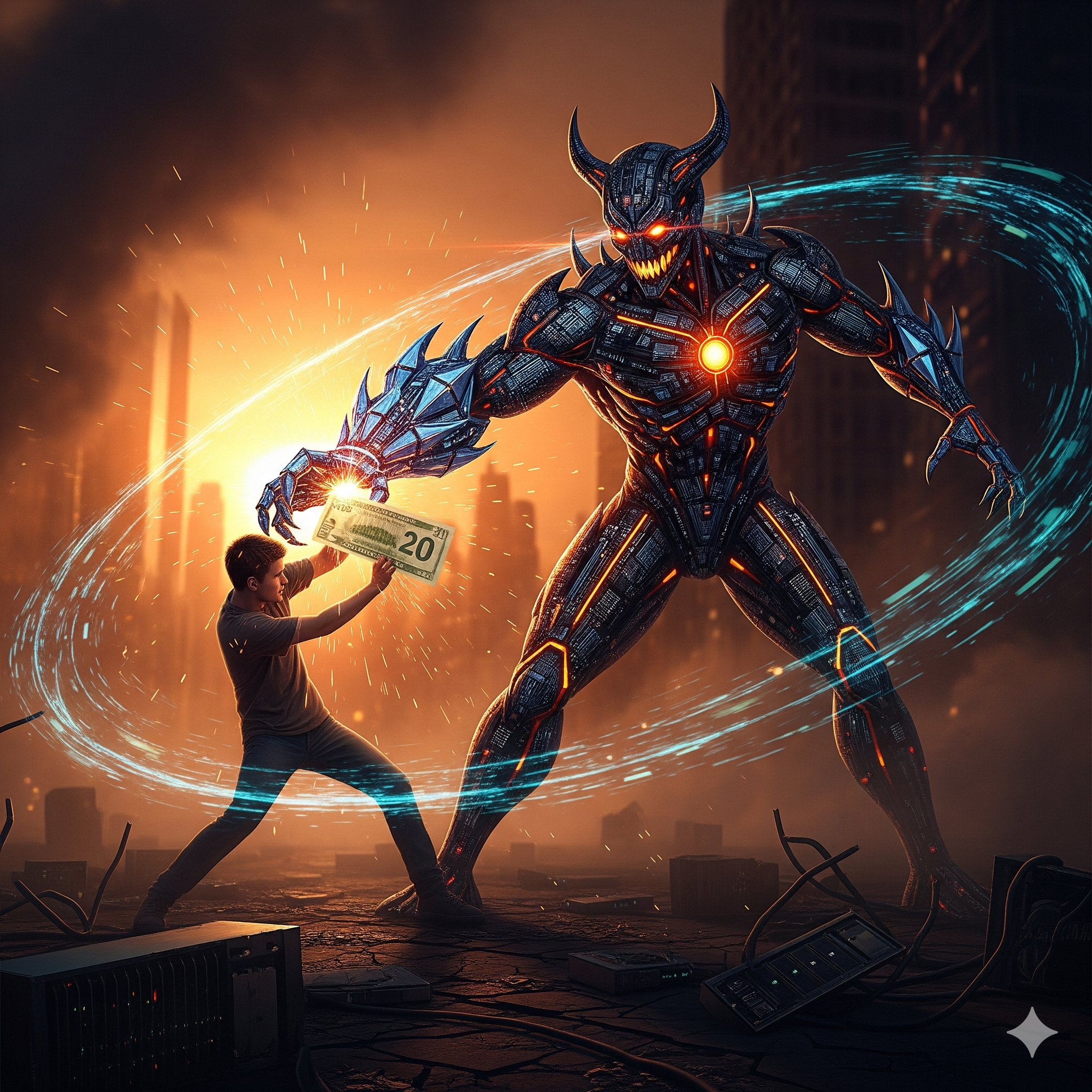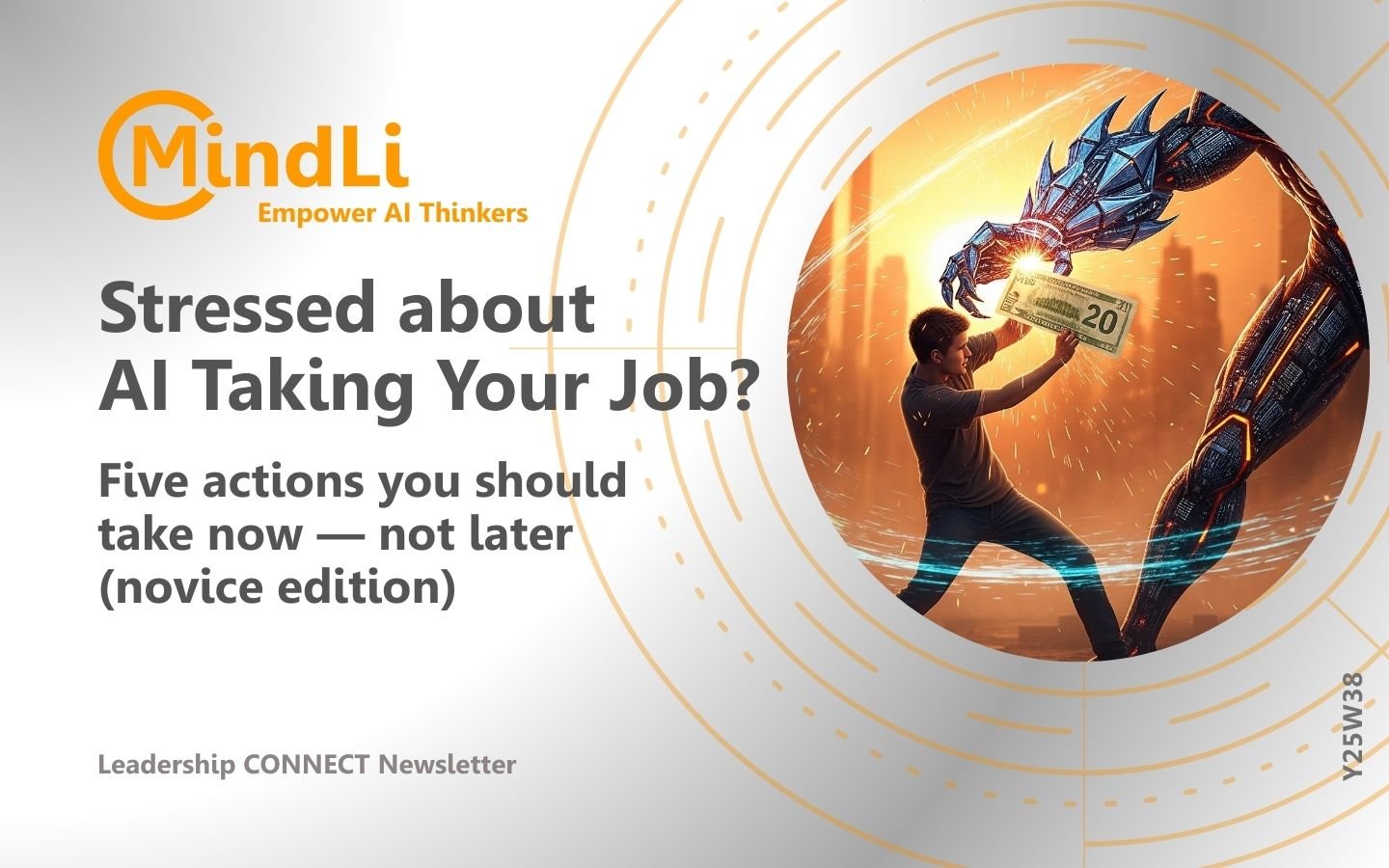Greetings, AI Thinkers,
AI is moving fast — and many feel the stress.
Jeff Bezos said, “Stress comes from not taking action over something you can control.”
So here are my five recommended actions you can take today:
1️⃣ 💳 Pay for AI (use it daily).
2️⃣ 📰 Track AI mega-news.
3️⃣ 🚩 Watch for red flags.
4️⃣ 🔍 Go beyond search.
5️⃣ 🧠 Adopt an AI-First mindset.
👉 Don’t just worry. Act.
Note: This is the novice edition, which my more advanced readers can share with their friends.
Also, feel free to send me more actions for the intermediate and advanced editions.
Let’s Think,
Dr. Yesha Sivan and the MindLi Team
P.S. Feedback? Email me.
Spark of the Week: Stressed about AI Taking Your Job? Five actions you should take now — not later (novice edition) (Source: Yesha On Human Thinking)

Note to my readers who are advanced AI thinkers. Feel free to use this when talking to your novice friends (If needed, I will do two more versions for intermediate and advanced thinkers).
How to Handle Stress?
I have been exploring stress for over 10 years. My answer, for myself and others, has always been action. As Jeff Bezos once explained: [1]
“Stress primarily comes from not taking action over something that you can have some control over… the mere fact that we’re addressing it … dramatically reduces any stress that might come from it.”
AI is a source of stress for both new employees and current ones. I have written extensively on the impact of AI on jobs in previous posts. My LinkedIn “private” group on the “Future of Work” includes even more data, cases, reports, and anecdotes. [2] (You are invited to join).
I aim to be as specific as possible to reduce stress through targeted actions.
Five Actions for the Novice User
- Pay the $20 for OpenAI or Anthropic—if you are not paying, you’re not taking your future seriously. When you do, you’ll feel compelled to use it and gain value from it. (Note: don’t share your AI with your mother, friend, spouse, etc.)
As AI learns your thought patterns and remembers your questions and chats, it becomes smarter. Use one of the big systems. It’s the same account for mobile and web. - Note and digest the AI mega news items as signs of the future — let’s consider these new headlines: Salesforce fired 4000 people, AI is key to the top 10 S&P firms, AI killed Adam [3], Oracle stock gained 36% to post best day since 1992, adding $244 billion in value. These are sample headlines from Sep-2025. In fact, we’ve seen a stream of AI-related, shocking, never-before-seen, market-changing headlines like these over the last 3 years.
While there’s a lot of hype surrounding such headlines, this hype is influencing daily decisions in your firm, field, and profession. - Be aware of the AI’s “red flags” — AI, as it is, has a lot of value. But it also introduces many problems. From fake news, to lazy minds, to surface-only answers, to lack of concrete value — and of course, hallucinations.
Watch out for red flags when creating with AI or consuming outputs produced by AI by co-workers. - AI is much more than just search — try asking for different results, exploring alternative positions, and moving beyond text to images, videos, and voice. See the ultimate guide “There is an AI for that” [4]
- Adopt an AI-First mindset — AI is different from any other technology we’ve encountered (speed of change, immediate value, complete replacement of human-led processes, and more). We are not fully aware of its impact. The way to prepare is to use it in as many ways as possible. Today, I used AI to help me clean a ventilator.
I took a picture and asked for help to get detailed instructions. Yesterday, I asked for the meaning of an expression, but received a completely wrong answer. The day before, I uploaded a Word file asking for a critique. Last week, I took a picture of 20 numbers (expenses) and asked for the sum. Sometimes, I do this as a mental exercise, imagining full AI implementation. How would this action or task be done differently if it were fully integrated?
My Take
One practical way to manage stress is through action. In AI, action is simple; inaction can be harmful. Let’s follow Louis Pasteur, who said, “Chance favors only the prepared mind.”
More Information:
- [1] Jeff Bezos on stress: https://www.youtube.com/watch?v=NqVoOC2azZI
- [2] My LinkedIn group on the “MindLi 🛠️ FOW – Future of Work Group” https://www.linkedin.com/groups/10042121/
- [3] “Was Adam Killed by AI?” See my post: https://digitalrosh.com/knowledge/collections/yesha-on-human-thinking-in-the-age-of-ai/was-adam-killed-by-ai-defining-red-flag-from-the-suicide-of-16-year-old-adam-raine/
- [4] “There is an AI for that” https://theresanaiforthat.com/
About MindLi CONNECT Newsletter
Aimed at AI Thinkers, the MindLi CONNECT newsletter is your source for news and inspiration.
Enjoy!
MindLi – The Links You Need
General:
- Website — MindLi.com — All the details you want and need.
- LinkedIn — MindLi 🌍 GLOBAL Group — Once a week or so, main formal updates. ⬅️ Start here for regular updates.
- WhatsApp — MindLi Updates — If you need it, the same global updates will be sent to your phone for easier consumption. This is similar to the above Global group — once a week or so.
- Contact us – We’re here to answer questions, receive comments, ideas, and feedback.
Focused:
- LinkedIn — MindLi 🧠 AI Group — More technical updates on AI, AGI, and Human thinking. ⬅️ Your AI ANTI-FOMO remedy — Almost Daily.
- LinkedIn — MindLi 👩⚕️HEALTHCARE Group — Specifically for our favorite domain — healthcare, digital healthcare, and AI for healthcare — Weekly.
- LinkedIn — MindLi 🛠️ FOW – Future of Work Group — thinking about current and future work? This is the place for you — Weekly.
- LinkedIn — MindLi 🕶️ JVWR – Virtual Worlds Group — About virtual worlds, 3D3C, JVWR (Journal of Virtual World Research), and the good old Metaverse — Monthly.
- LinkedIn — MindLi Ⓜ️ Tribe Group — Our internal group for beta testers of MindLi, by invite — when we have updates, call for advice, need for testing, etc (also ask about our special WhatsApp group).


